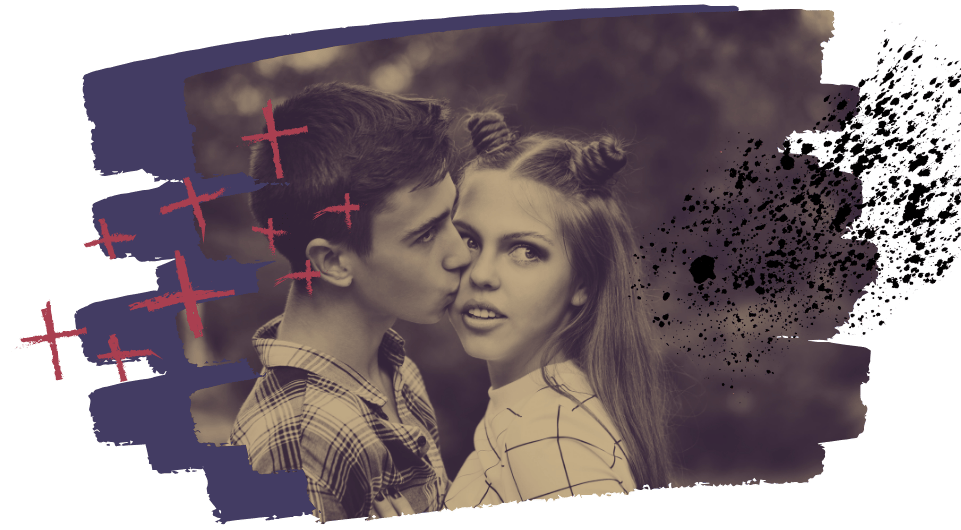Abuse myths and facts
The truth about abuse: myths, facts and shining a light on victim-blaming
READ METoxicity, gaslighting, psychological abuse and unhealthy relationships: all the stuff you need to know for safe dating, romantic, and sexual relationships

This article was written with the support of Project Paradigm – experts in protecting teens from sexual exploitation.
Content warning: Involves discussion of abuse and sex, which may be triggering or distressing. Please note: gendered language may be used, especially where discussing issues that are heavily gendered.
Even the most abusive relationship can start off great. The person doing the abuse might not start out ‘bad’. They might shower you with gifts, say things that make your heart flutter, and do things that make you feel really loved.
Sounds great, right? And it can be a sign of a healthy relationship! But it can also be a form of something called 'love bombing'. Love bombing is when you’re given lots of love, attention and affection, including stuff like flattery and over-the-top gifts - making you feel obligated or indebted to the person doing it.
Love bombing is a manipulation tactic intended to make you feel close and trusting with a person very quickly, and not realise that this is all moving too fast. Otherwise, you'd notice your boundaries are being crossed, privacy invaded, and independence squashed.
The problem is that it can honestly be really hard to tell the difference between love bombing – and just a new relationship that’s in the ‘honeymoon’ phase.
Over time, things start to get more and more toxic.
People who are experiencing abuse often feel like they are in control and making choices – and can find it hard to see the abuse objectively. The person who’s experiencing abuse starts to feel worse about themselves – and this can make it harder for them to identify toxic behaviours, leave the relationship or get help.
But what’s the difference between a toxic relationship and an abusive one?
Toxic relationships are unhealthy, but they're not necessarily abusive. Toxic behaviours aren’t always on-purpose (and often the people doing them lack self-awareness), and both people in the relationship can feed the toxicity. Toxic behaviours might include:
You give more than you get, leaving you feeling tired
Toxic or disrespectful communication style, like criticism or mocking
Not ‘fighting fair’ and respectfully, e.g. holding on to grudges
Ignoring your needs
Dishonesty/lying
Being jealous or envious
You are made to feel like you’re always to blame
Unhealthy competitiveness
And many more!
Emotional abuse can look like:
First things first, you need to decide what you want from that person or relationship. This allows you to set boundaries (if it’s safe to do so). You want to make it clear what you’re not ok with, and what you’ll do if that happens. e.g. “If you start texting me when I’m out with friends, I’m turning my phone off”.
Figure out what you want to share with them and what you want to keep private, e.g. “I’m not comfortable giving you my Instagram password as that feels like an invasion of my privacy”. It can also be helpful to have an ‘exit strategy’, i.e. an excuse to leave the conversation if you start to feel distressed, i.e. “I promised I’d call my dad at 3pm – I better go do that now!”
Some behaviours are changeable – but you need limits on trying to change them (as this is something that often keeps people trapped in a toxic relationship or a cycle of abuse). Detach when you can - this might mean refusing to participate in ‘drama’ or avoiding topics that might ‘stir things up’.
Depersonalise their behaviour. Know that you are not responsible for their behaviour and that you can’t control it. This can be an important part of looking after your own wellbeing (as toxic relationships can really make you feel worthless sometimes). We also really recommend getting support – a professional (like a Kids Helpline counsellor) can help you make a plan to deal with your unique situation, and can help you with your mental health and self-esteem too.
It’s perfectly ok to end the friendship/relationship (if possible and safe to do so).
You are a lovable person who deserves respect, care and affection.
Minimisation
They regularly dismiss or minimise your feelings, e.g. “It’s not a big deal. You’re so sensitive”.
Denial
They deny things that have happened, e.g. “I never said or did that"
Criticisms
They ‘attack the person’ (to divert you away from important discussions), e.g. “You know that friend’s unstable, so you can’t trust their judgement on things.”
Manipulation
They might use stereotypes about your identity, like your gender or race, to manipulate you, e.g., “It’s not a big deal. You’re just overreacting because you’re on your period”.
Doubt
They ‘counter’ or question your memories, experiences, and interactions, making you doubt yourself, e.g. “Are you sure that’s what happened? I don’t remember it like that”.
Deception
They refuse to engage in conversation, or pretend they do not understand, e.g. "I never know what you’re on about”.
Remember that gaslighting is a form of emotional abuse - and that's not ok! Get some space from the person or situation (if you can). Get support (and a second opinion) from someone who is a trustworthy person (like a school counsellor). You might decide to end the relationship with the person gaslighting you (if you can).
If ending the relationship isn't an option, figure out your personal boundaries and how you want to manage them (a support person can help you with this). Make sure you look after yourself through self-care. It’s also important to rebuild your self-esteem and confidence by spending time doing things you enjoy with people who help you feel good about yourself.
Child sexual exploitation is a form of child sexual abuse. It occurs where an individual or group takes advantage of an imbalance of power to coerce, manipulate or deceive a child or young person under the age of 18 into sexual activity (a) in exchange for something the person being abused needs or wants, and/or (b) for the financial advantage or increased status of the person doing the abuse.
The young person being exploited may have been sexually exploited even if the sexual activity appears consensual. Child sexual exploitation does not always involve physical contact; it can also occur through the use of technology.
This include being catfished to send nudes to your ‘new online girlfriend’, getting hacked and having private images/videos stolen, deep fakes (creating sexual images or videos using AI), experiencing ‘capping’ (someone taking sexual images of you during a live stream without you knowing), or a partner or ex-partner sharing your nudes without your consent (‘revenge porn’).
Online exploitation is a crime and no one deserves to be abused (even if you willingly sent the images in the first place). Check out our dedicated sextortion and ‘revenge porn’ articles for info and support on this.
There are people who will support you if you are in this situation (including Kids Helpline). It’s important to get help asap as there are things you can do to stop images being shared or get images that have been shared back or removed.
The relationship seems legit at first. The adult might do things to ‘groom’ the teen (build their trust in order to sexually abuse or exploit them). For instance, they may give special attention or presents, i.e. ‘love bombing’.
Early grooming can be tricky to identify because attention and presents can also be a normal part of just being in love. However, grooming escalates over time and the teen (or their friends) might start to see behaviours like being isolated (telling them that ‘no one else cares about you like I do’), encouraging rule breaking (‘runaway and come and live with me’), and using threats or blame (‘it’s your fault’). The teen might be told to keep secrets, and find their sexual boundaries are tested or pressured.
One tell-tale sign is when they ask the teen to have sex with someone other than them (they normally have a ‘reason’ for this, such as asking them to use sex to pay off a drug debt). In these types of relationships, it often seems like the teen girl is in control and making choices e.g., it might seem like the teen ‘consented’ to have sex with other people in this situation.
Sometimes teens are used to exploit other teens through ‘favours’ or threats, e.g., asking you to bring friends to a house party, where the friends are given drugs or alcohol and sexually abused.
These kinds of relationships are abusive and very harmful – and it’s important to take action and get support (for you, or your friend).
"[My friend] Sophie really started to change, and she hated everyone except [her boyfriend] Jake."
If you think you’re at risk of or are experiencing sexual exploitation (or you’re concerned about a friend), it’s important to get professional support ASAP.
What’s happening isn’t your fault, and services (like Kids Helpline) have specially trained staff who will believe you, respect you and support you. They can give you a ‘second opinion’ on what’s happening (especially if you’re feeling unsure), can talk you through your different options, and can help you figure out what to do/ your next steps. Here are services that can help:
Abuse myths and facts
The truth about abuse: myths, facts and shining a light on victim-blaming
READ MEMy friend’s partner is abusive
If you’re worried that your friend is in an abusive relationship, ...
READ MEWhy does abuse happen?
You have a right to be safe. Abusive family relationships are complicated. ...
READ MERevenge porn and image-based abuse
‘Revenge porn’ is a type of image-based abuse that can happen online. ...
READ ME
Talking helps! We’re here for you.
No problem is too big or too small.
We're here 24 hours a day, 7 days a week